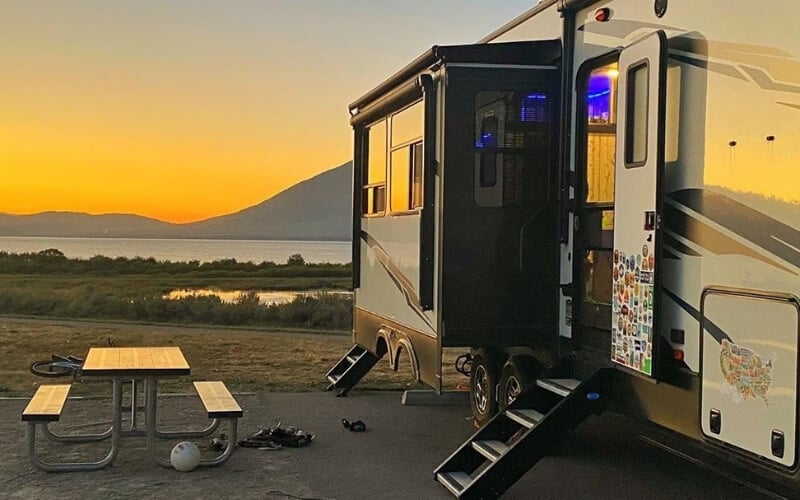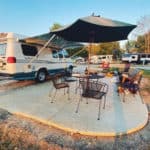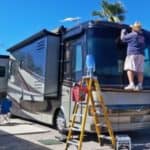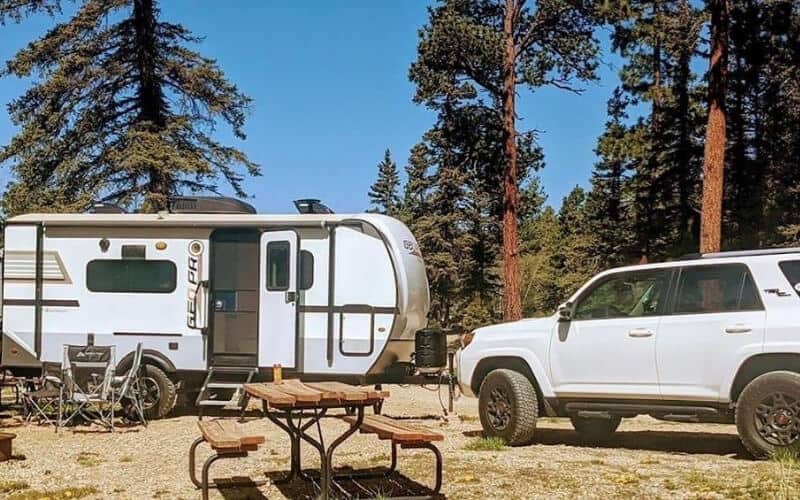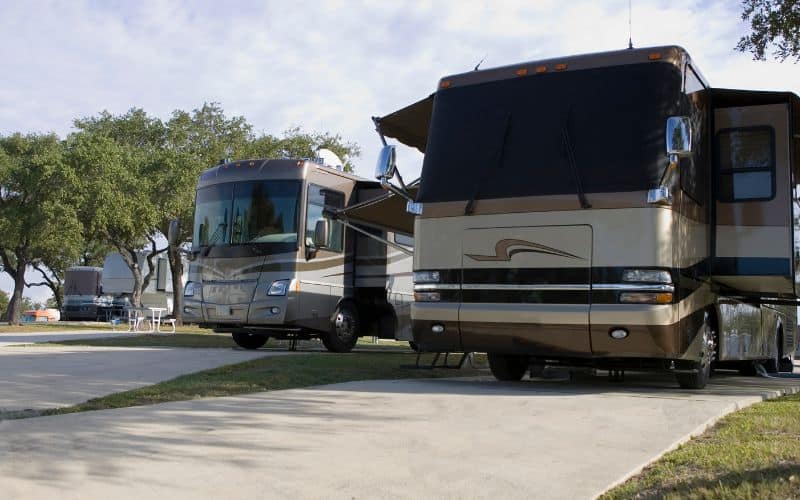The RV lifestyle can be as exciting as it is rewarding. This drives some people to live in their RV full time.
While this certainly frees you up from things like yard work and having to endure boring homeowner’s association meetings, it still means dialing into a different lifestyle.
There are some distinctions and even a few potential regulations that can come into play when you start using your recreational vehicle as your full-time residence.
This includes things like financing, tax breaks, and even state laws.
If you are thinking about “Full-Timing” you might be wondering if you can finance an RV as your primary residence?
There are two ways to finance an RV, if you finance it as a motor vehicle loan, you won’t truly be able to claim it as your primary residence until it is fully paid off. Though if you meet certain criteria, there are some lenders who will let you finance it as a converted mortgage. However, there could be other considerations that might come into play.
To really understand how to finance your RV as a primary residence, and the various regulations that apply, we will need to take a close look at some key details.
This includes the different types of loans, fees, qualifications, insurance and more.
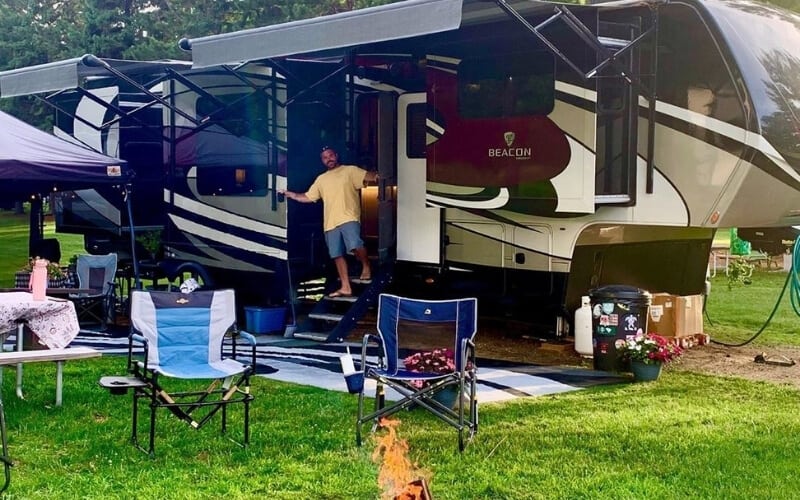
How Do I Qualify My RV As My Primary Residence?
The process of claiming your RV as your primary residence starts with finding the right financial institution and exploring your financing options.
This can include things like taking out a personal loan, working with a credit union, or a larger lending firm.
As you start dialing in your lending option, you’ll also want to take into account other regulations and possible loopholes that might apply. This includes things like:
The Size Of The RV
In certain states there are requirements for what size an RV or dwelling must be to be considered a residence. There might also be a special driver’s license endorsements that apply.
The Capabilities & Amenities
In some states some basic capabilities and amenities must be included in the RV to be considered a residence.
If you are going to permanently park your RV there might be county and township regulations that also apply.
Equity & Depreciation
Most residential homes appreciate or go up in value relative to the surrounding housing market. This also factors in with the amount of land that is included in the property.
Unfortunately, RVs tend to depreciate with time. Some can depreciate as much as 30%.
This can be a major problem if you hope to take out a home equity loan in the future or plan to resell it later on. It can be a major sticking point for potential lenders.
Tax Codes
The Internal Revenue Service (IRS) has provisions that allow you to classify different assets as your primary residence.
This includes RVs as well as boats, mobile homes, and condominiums. To be able to classify your RV as your permanent residence it needs to have a functioning kitchen area, sleeping quarters, and functioning toilet facilities.
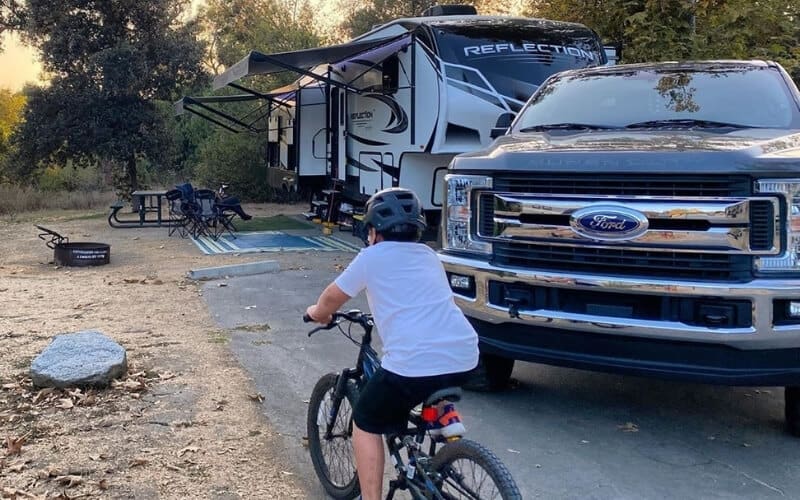
How To Declare Your RV As Your Primary Residence
Several important steps go into declaring your RV as your primary residence.
The IRS notes that “Every legal tax-paying citizen may only claim one place as their primary residence at any one time.”
Most states require that you live at that residence for a minimum of 6 months and 1-day.
This must be provable in some way, such as by paying bills from that residence and maintaining local codes.
It’s especially a sticking point for snowbirds, who might want to spend the winter in a state like Florida, where there is no state tax, but then spend the summer in a state like Minnesota, where state taxes do still apply.
To qualify as a primary residence your RV must contain sleeping quarters, a kitchen, and a fully functioning toilet.
Tax Breaks For Using An RV As Your Primary Residence
When you claim your RV as your primary residence you also can qualify for the homeowner’s tax deductions, which can save you a lot of money on your federal income tax each year. Though there are some caveats to consider.
To qualify for the homeowner tax exemption, you need to purchase the RV as a security or as collateral for the mortgage.
This allows you to deduct your mortgage interest just like you would with a brick and mortar home.
You might be able to qualify for other tax deductions if you are also using your RV as a home office or business headquarters.
Though this will likely void your homeowner’s tax deduction.
So, if you are a traveling businessman and you are thinking about making your RV your primary residence, you might want to consult with an accountant to decide which route is best.
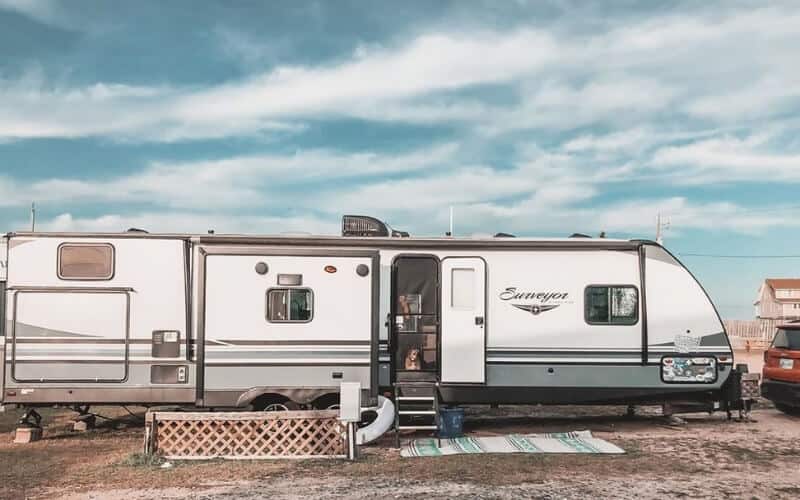
Does An RV Qualify As A Dwelling?
Deep within the tax codes and zoning ordinances, you will find the term “Dwelling” being used in place of “Residence” for defining secondary homes and properties.
If you were to permanently park your RV on a lake lot, while still living in your brick and mortar home, it would be considered a dwelling, that doesn’t qualify for the tax breaks of a primary residence.
Other Financial Factors Of Claiming Your RV As Your Primary Residence
The Internal Revenue Service does have other regulations that apply when you start to claim your RV as your primary residence.
This includes the fact that things like motor vehicle rates and RV insurance are categorized differently from homeowner’s rates and homeowner’s insurance. Including things like the first-time homebuyers tax credit.
Normally, when you purchase an RV it is with some type of motor vehicle loan. You will need to find a lender who will borrow you the money to convert it to a residential home loan.
If you don’t do this, you could face stiff tax penalties in the long run. Of course, the other way around this is to purchase the RV outright.
Do You Pay Escrow Fees When Financing An RV As A Primary Residence
Escrow is often the preferred method of retaining loan money for a mortgage. The problem is that mortgage escrow fees tend to be high, especially on a principal dwelling.
Federal laws state that you can only claim one property as your principal dwelling at a time.
Just make sure that you are in love with your RV as your primary residence, as changing your primary residence afterward can still leave you with massive escrow fees on your RV, even if you move to a home or apartment.
As time goes on RVs generally cost significantly less than a traditional mortgage.
Though this doesn’t include the costs associated with maintaining it, as well as recurring things like fuel cost.
Choosing The Right Loan Term And Loan Payment Amount
Whether you decide to finance your loan for your RV residence via an automotive escrow account or you finance it as a property with a mortgage, you will still need to consider how many months you want to take out the loan.
This will ultimately influence your payment per month both in principle as well as interest.
In the case of a traditional home loan for a brick and mortar house, 30-years tend to be a popular term.
Unfortunately, this also means that early on in the loan you are paying a lot in interest, compared to the principal.
Depending on how much money you put down at loan origination, you could end up with very little equity to show for it in the early years.
In the case of an RV, financing it for 30-years or 360-months isn’t usually prudent.
Especially when you consider how much it will depreciate in the early years. With an RV, 15 or even 10-years is more realistic for a loan term.
While this will inevitably increase the size of each monthly payment, you will pay it off faster and accrue equity sooner.
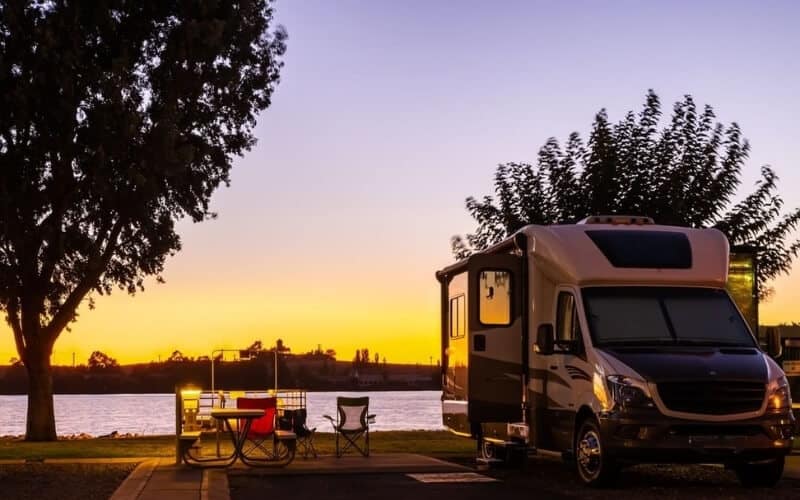
Making A Down Payment On Your RV Residence
Most lending institutions require you to put a minimal amount of money down as good faith money.
This might vary from one lender to the next. Most require a minimum of 3 to 5% of the total purchase price.
The problem with putting a small single-digit percentage down on an RV or any long-term loan is that you have very little equity.
Depending on your state, they might also require you to take out mortgage or loan insurance (PMI) which will further increase your monthly payment.
In general, putting down 20 to 22% on the loan, whether it’s as an automotive loan or as a mortgage will give you more initial equity.
This also tends to be the range where additional mortgage insurance is no longer required by the lender.
Insurance Requirements For An RV Residence
Most lenders require you to maintain a specific level of insurance while you are paying off the balance of the loan.
In the case of an automotive loan for an RV, this usually includes liability as well as collision.
Once the balance of the loan has been paid off, you can opt-out of the collision coverage, which will reduce your monthly insurance payment.
If you convert your RV loan to a mortgage, the lender will likely require a specific level of coverage.
This might vary depending on whether or not you are going to be permanently parking your RV, or if you are going to be relatively mobile with it during a given year.
State Laws Related To Making An RV Your Primary Residence
Beyond the federal government and the Internal Revenue Service, there might be some state laws that can influence your ability to designate your RV s your primary residence.
A lot of states classify individuals living at a property as either a “Resident” or a “Domiciliary.”
- A Domiciliary : This is an individual who claims a specific State as their legal, permanent residence. Each state has its own requirements to qualify as a domiciliary. This often includes living within the state for 6 months or more. Though some states might also require you to have resided in the state for 6 to 12 months before claiming the state as your permanent legal residence.
- A Resident : This is someone who resided within the boundaries of the state full time. This also means you all state laws apply. Especially tax laws and special residency codes. Here again, most states have their own specific rules about what one needs to do to classify as a resident.
Common State Resident Requirements
Different states have different requirements for an individual to claim it as their legal state of residence. This includes things like:
- All vehicles and recreational vehicles are licensed to the state
- Gainfully employed in the state
- A valid driver’s license from the state and no other
- A verifiable mailing addresses within the state
- Designating the intention of making the state your permanent and legal place of residence
- Living in the state for at least 30, 60, or 120 continuous days
- Residing in the state for at least 6 months and 1 day.
Frequently Asked Questions
How Can I Receive Mail For An RV Residence?
Receiving mail can be one of the big challenges of full-timing in an RV as your primary residence.
If you are parking up permanently at a lake lot or plot of hunting land, the local township might have rules about mailbox requirements.
Depending on their covenants, you might be able to simply use the property’s address as your mailing address.
If you are going to be on the move, living from one RV park to the next, you might be able to use the RV park as a forwarding address.
Some RV parks that offer seasonal or long-term lot rentals will be happy to let you use their address as your own. Then they assign you a post office box inside their canteen or main office.
If you are going to be moving around the same general area or state, you might want to consider getting a post office box.
They are relatively inexpensive, and you can arrange to make periodic stops to check your mail for things like holiday cards, and snail-mail letters from family or friends.
In a scenario like this, you might want to set up all your bills to be “Paperless.”
How To Set Up Waste Management
To qualify for as a residence in the eyes of the federal government and the IRS your RV residence will need to have a functioning toilet.
This means a black water tank and likely a gray water storage tank that needs to be periodically emptied.
If you are living in an RV park with a long-term contract, they likely will have some sort of connection service rolled into the cost to rent your space.
This will spare you the headache of having to make frequent trips to the RV park’s dumpsite with a wastewater storage tank.
If you are going to be parking your RV at a lake lot or hunting property, you might want to consider having a septic tank with a drain field installed.
Depending on where you are and the available contractors, you might be able to get this done for as little as $5,000. Though it could run as high as $20,000 in difficult terrain.
While these are all of the most common ways to obtain residency, qualifications will still vary from state to state so make sure you check with your local laws and regulators before deciding if you can legally qualify as a resident of your state.
The process of declaring any place as your primary residence is largely the same given the fact that it’s regulated by the IRS.
As instated by the IRS, every legal tax-paying citizen may only claim one place as their primary residence at any given time.
The place that you designate as your home must be a location that you live in regularly throughout the year.
The great thing about it is that any vehicle or property can be considered as your primary residence as long as it contains the three qualifying factors which are sleeping headquarters, a kitchen, and a working toilet.
Some more great news is that if you decide to use a boat or some other kind of vehicle as your primary residence, it doesn’t have to have a permanent location and you can still claim it on your taxes.
Once you factor in the thought that you’ll still be paying home mortgage escrow rates when you decide to make your RV a primary residence, you’ll soon realize that making an RV your primary residence is not necessarily cheaper than financing a full-on home or another type of property.
To make something very clear, RVs typically do cost much less over an extended amount of time than traditional mortgage loans however once you factor in the cost of actually maintaining the RV and all of the other expenses, you’re responsible for, the two cost differences can become very close within an instant.
Is It Hard To Get RV Financing Approval?
Assuming you meet the credit score and income requirements of a specific lender, getting financing for an RV as a motor vehicle loan is relatively easy. Especially if you are financing through a dealership.
Though lenders might be less likely to offer you the financing to convert the loan like a mortgage.
In a scenario like this, you should plan on taking several days if not weeks shopping for the right lender.
What Credit Score Do I Need For Financing And RV?
With any loan, the higher your credit score is, the more likely lenders are to give you a friendly interest rate, and fast approval.
Ideally, you want a credit score of at least 660 or higher. Especially if you are hoping to be approved for an RV mortgage.
If you are applying for a motor vehicle RV loan, you might be able to find a lender who will approve you with a credit score in the 550-range or higher. Though your interest rate will not be as nice.
How Long Does It Take To Be Approved For An RV Loan?
These days loan processing and approval are faster than ever. Most of the time, you can get a quote or preapproval in 48 to 72-hours.
You are even more likely to get approved if you have “Good Faith” or “Earnest” money in hand.
Is Financing Your RV as a Home Worth it?
Financing your RV as your primary residence can have some benefits and some drawbacks. You’ll need to make sure to do your homework before embarking on this liberating path.
Once you have dialed in your ideal RV, and price range, you’ll want to gather your down payment before approaching a potential lender.
You want to have some type of earnest money or down payment for them to take you seriously. Especially, if you want to finance your RV with a converted mortgage.
Once you’ve got your earnest money and down payment sorted out, you can shop competitive quotes from different lenders.
If you are going through a dealership and you want to take out a motor vehicle loan, you will likely find faster approval.
The tradeoff here is that you won’t enjoy the tax breaks that come with a traditional mortgage.
Along the way, you’ll want to make sure that you’re aware of all state and federal regulations for what qualifies as a permanent residence, as well as any residency requirements.
You want to make sure that you meet the IRS requirements of the RV having sleeping quarters, a kitchen, and a functioning toilet.

